| Subject | Kinesthesia 2024-25 |
| Event | Senate Event |
| Session | 2024-25 |
| Year | 1st, 2nd, 3rd & 5th Year |
| Date | 3rd to 7th February, 2025 |
| Time | 8:30 a.m. - 3:00 p.m. |
| Faculty | Prof. Neha Deshpande and Prof. Prathamesh Deshpande |
| Organizing team | Shrutika Patil, Aditi Raul, Yash Devda, Bhakti Kadam, Atharva Niwate, Ritvika Kokane |
| Venue | 2nd and 4th floor studios |
The Kinesthesia event at Pillai College of Architecture, held from 3rd to 7th February 2025, offered five exciting days of workshops, inspiration, and architectural exploration. Conducted to enrich students’ educational experiences, the event featured a curated mix of hands-on activities, insightful sessions, and expert-led discussions. Its goal was to expand students’ knowledge, enhance practical skills, and create valuable opportunities for networking within the architectural community.
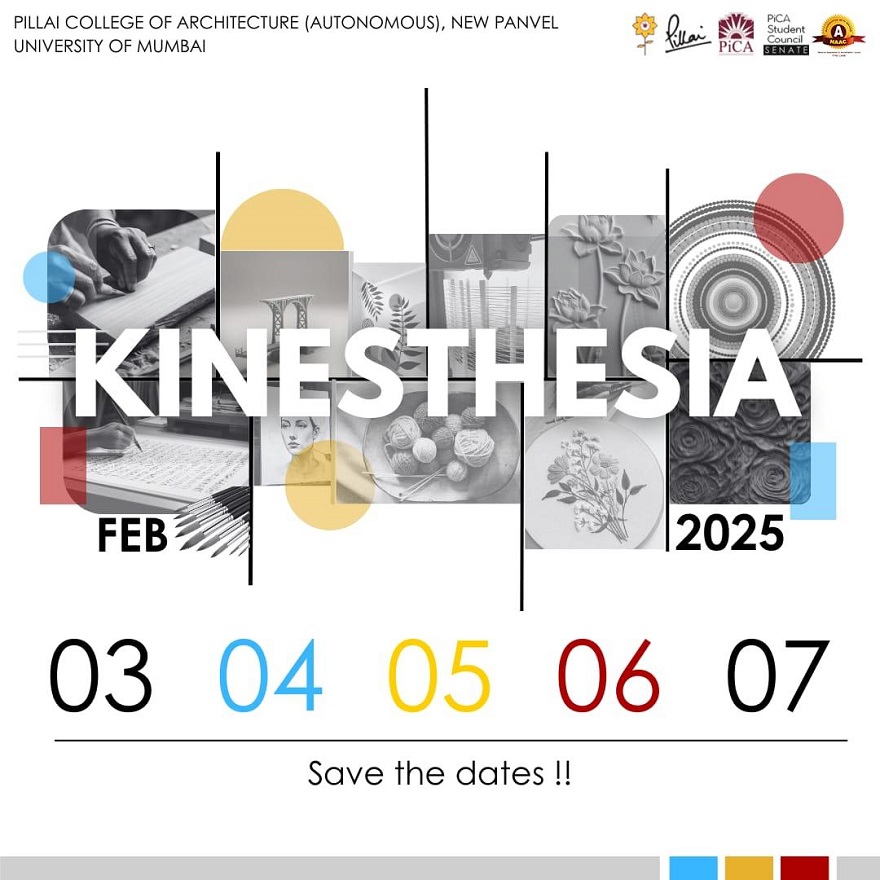
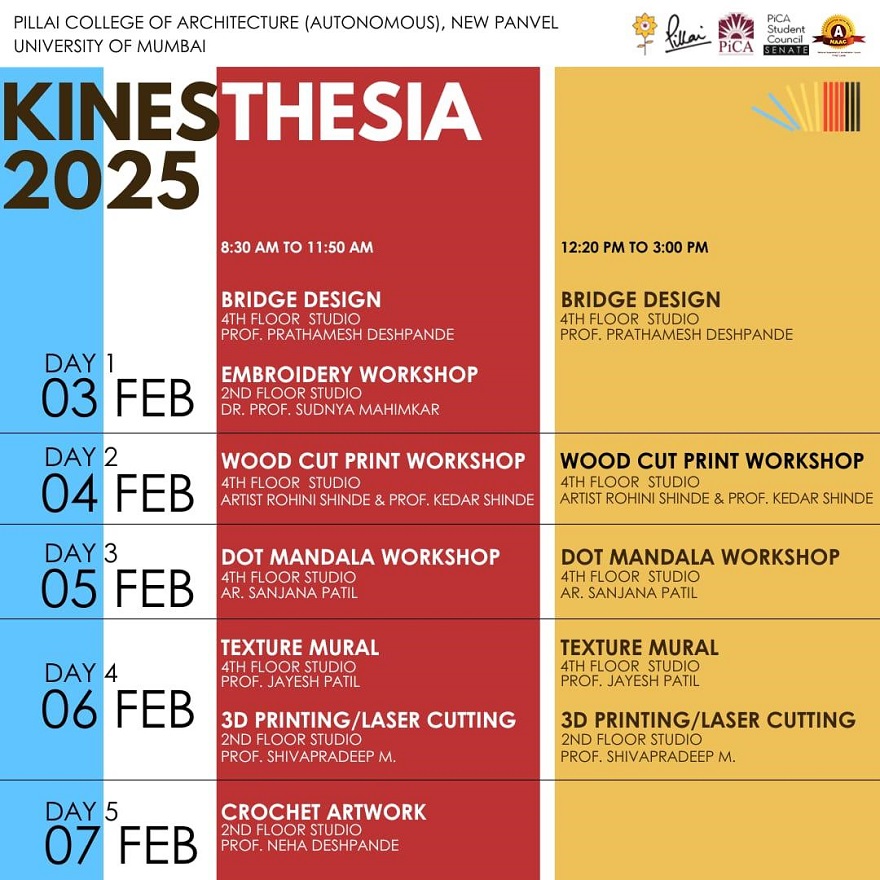
DAY 1
Day 1: Bridge Building Workshop (Workshop 1)
Time: 8:30 a.m. to 3:40 p.m.
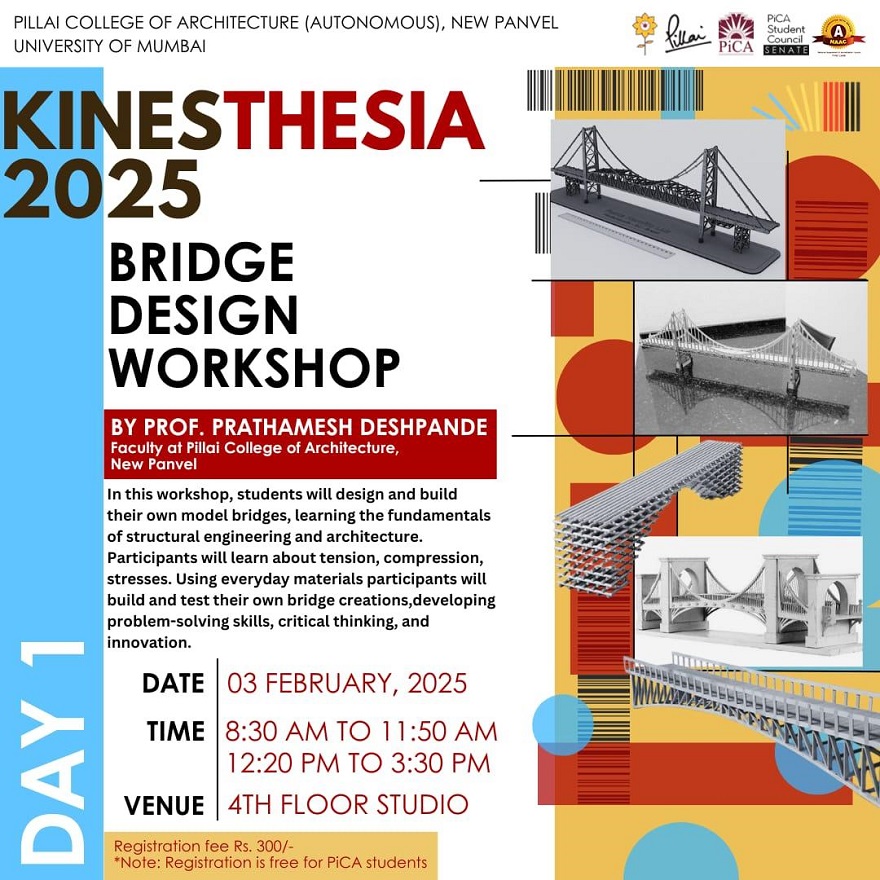
Instructor: Prof. Prathamesh Deshpande
Objective: To introduce students to structural engineering principles, material selection, and the mechanics of bridge construction, enhancing their problem-solving skills and technical knowledge.
Professor Prathamesh Deshpande introduced students to the fundamentals of bridge engineering, explaining structural principles, material selection, and load-bearing capacities. The session was conducted for architecture students eager to explore practical applications of structural design.
The workshop began with a theoretical overview of different bridge types, followed by real-world case studies. He demonstrated model-making techniques, allowing students to construct miniature bridge structures using various materials. Emphasis was placed on stability, durability, and innovative design solutions.
Through hands-on activities, participants experimented with tension and compression forces, testing the strength of their models. The interactive format encouraged problem-solving and teamwork. Professor Deshpande’s expertise and engaging approach fostered a dynamic learning environment.
By the end of the session, students gained a deeper understanding of bridge construction, equipping them with valuable knowledge for future architectural and engineering projects.

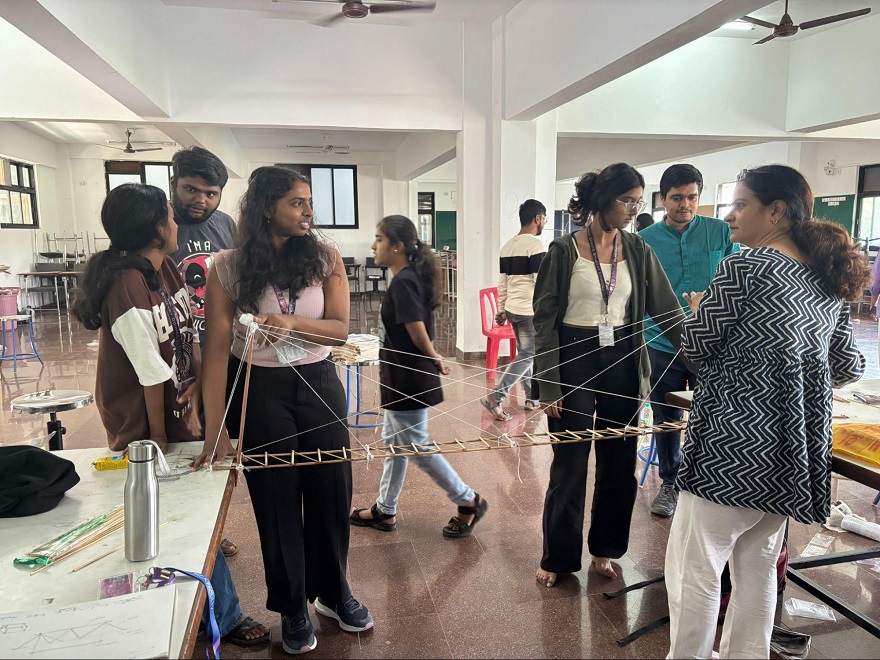
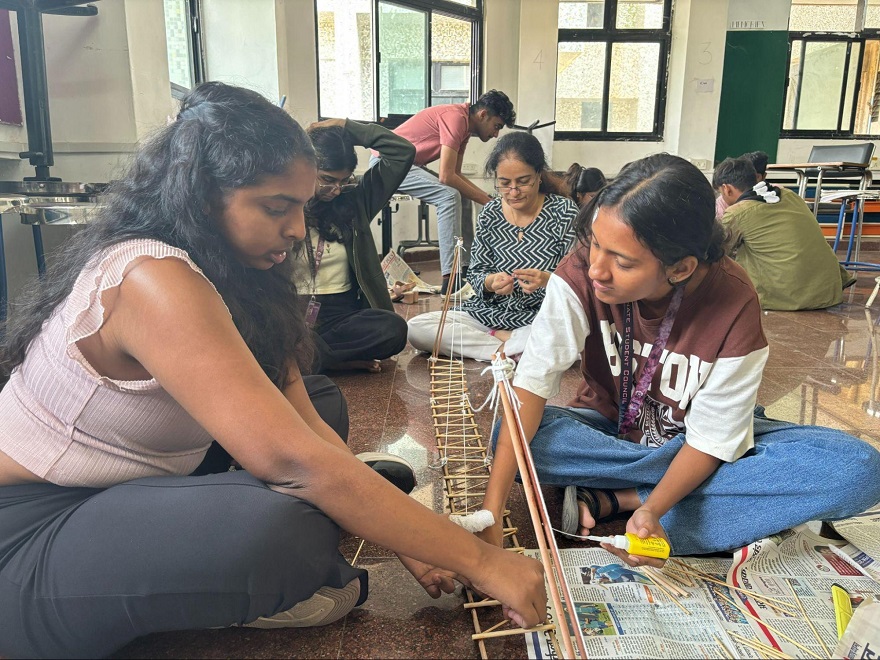
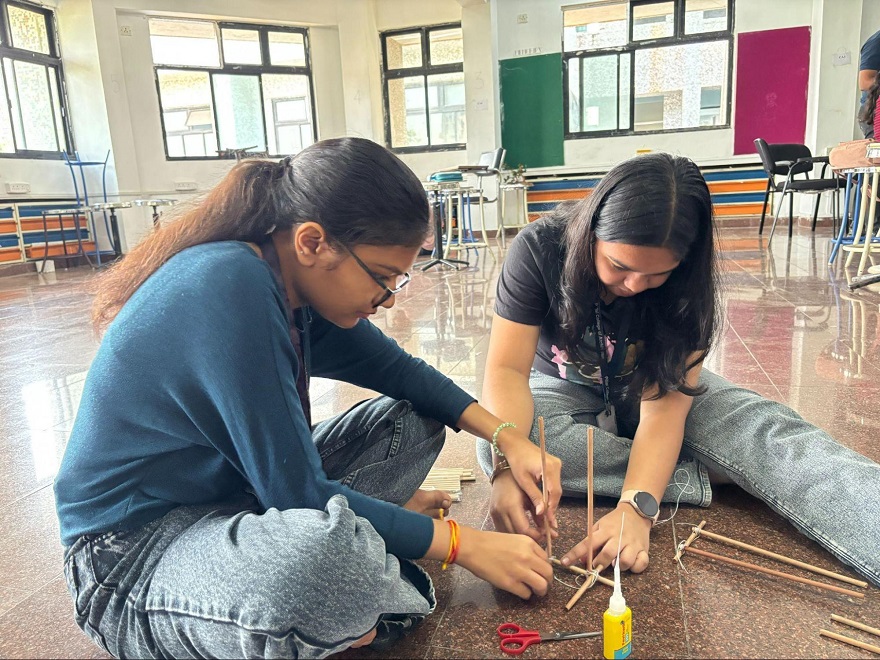
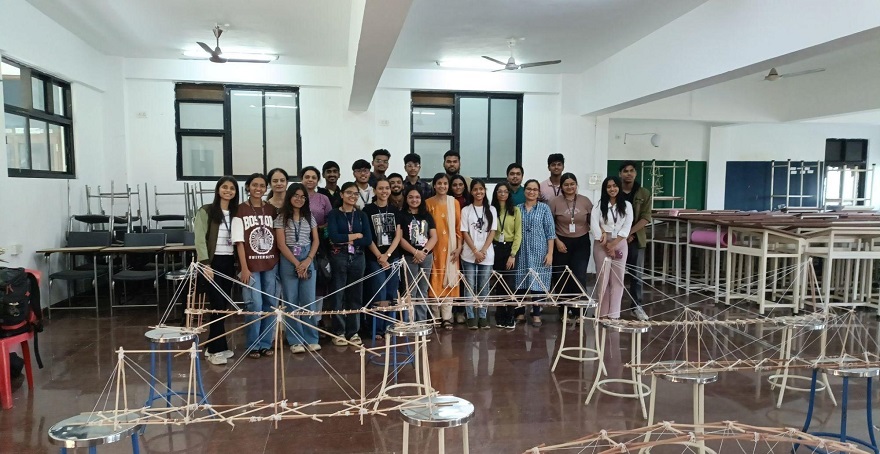
Day 1: Embroidery Workshop (Workshop 2)
Time: 8:30 a.m. to 3:00 p.m.

Instructor: Prof. Dr. Sudnya Mahimkar
Objective: To teach students traditional and contemporary embroidery techniques, enabling them to enhance their textile design skills and explore fabric as a medium of artistic expression.
Dr. Sudnya Mahimkar conducted an immersive embroidery workshop, introducing students to traditional and contemporary stitching techniques. The session attracted textile enthusiasts interested in fabric art and craftsmanship.
The workshop started with an overview of embroidery’s historical significance and evolving design applications. Prof. Dr. Mahimkar demonstrated various stitches, including running stitch, satin stitch, and French knots.
Participants practiced embroidery on fabric swatches, experimenting with different textures, colors, and patterns. Hands-on exercises enabled students to refine their needlework skills while exploring artistic expression.
Her patient guidance and expert feedback helped students to learn a new skill. The workshop successfully emphasized embroidery as a timeless, versatile
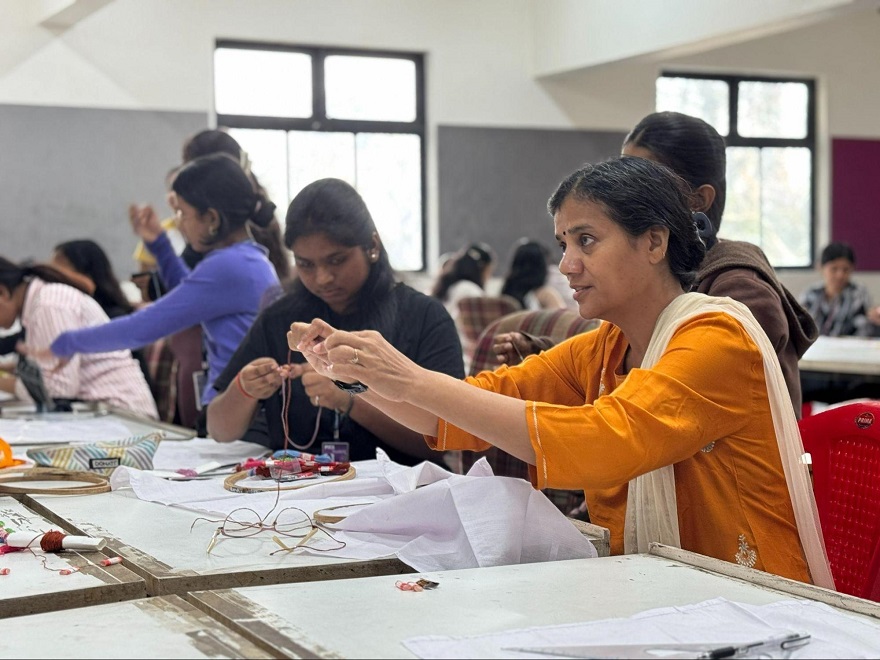
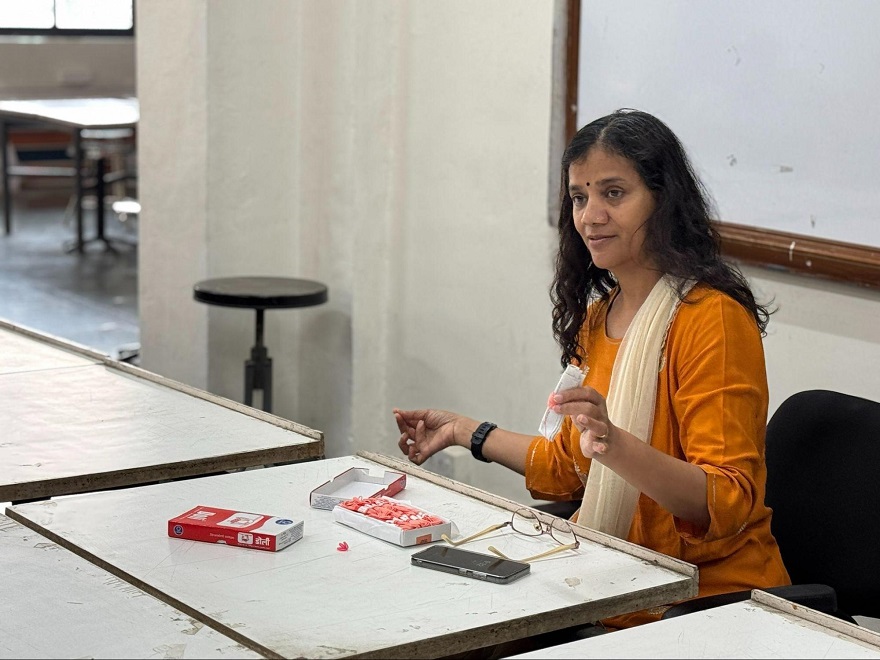
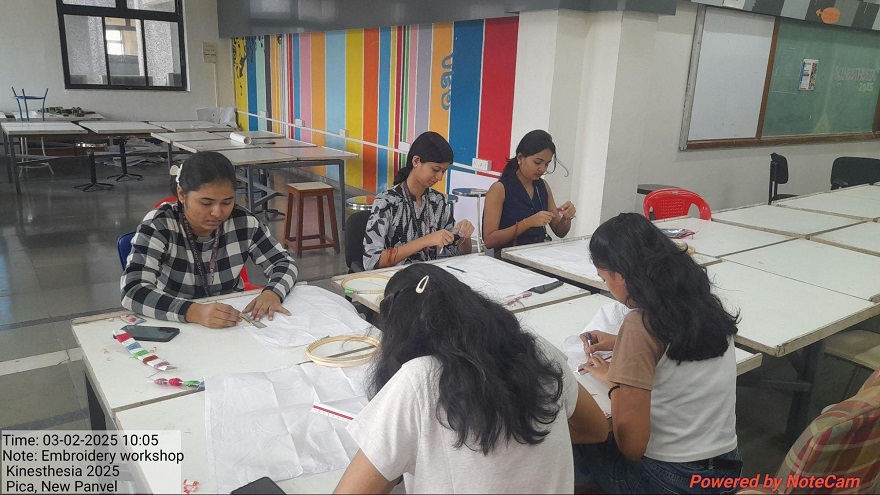
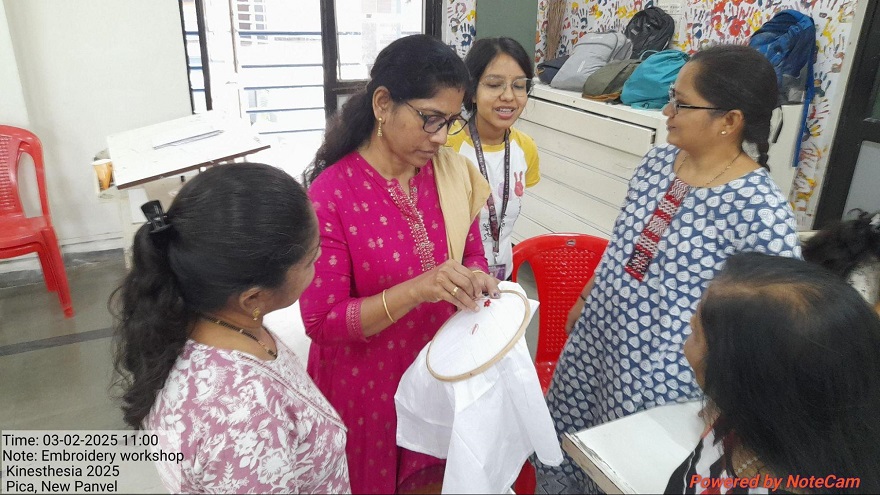
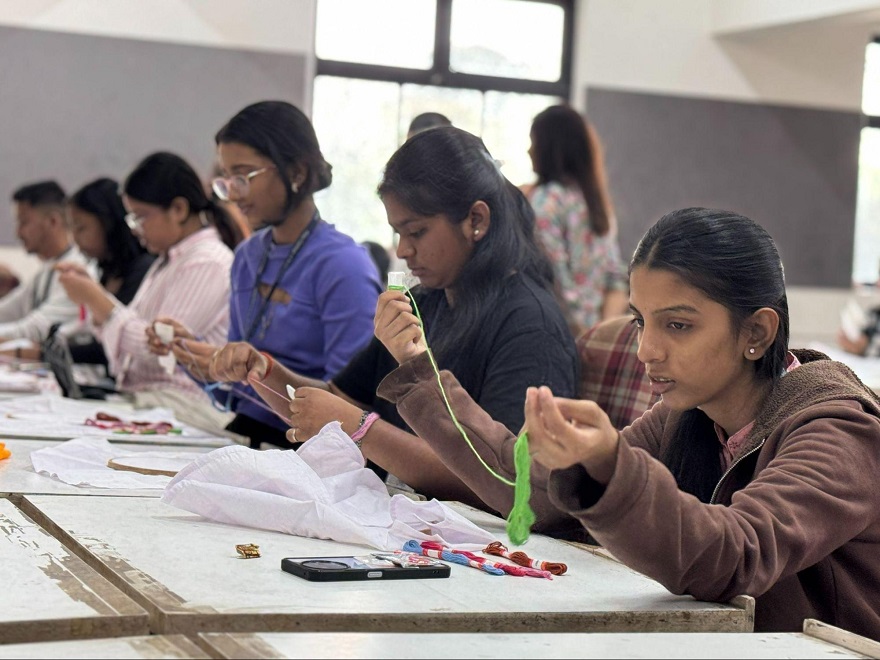
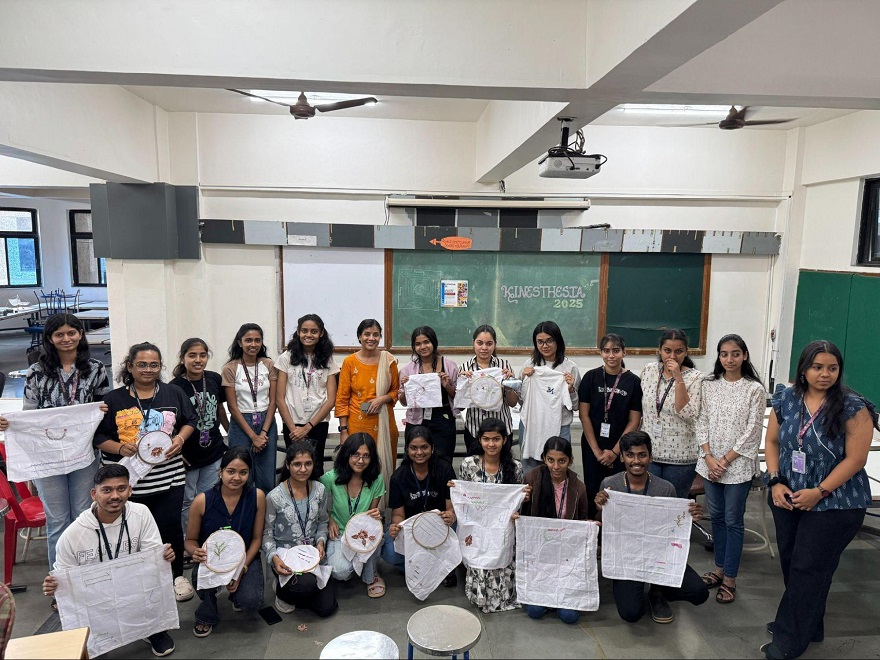
DAY 2
Day 2: Wood Cut Printing Workshop (Workshop 3)
Time: 8:30 a.m. to 3:30 p.m.

Artists: Rohini & Professor Kedar Shinde
Objective: To introduce students to traditional wood cut printing techniques, helping them understand relief printing and develop their artistic skills through hands-on practice.
Artists Rohini and Professor Kedar Shinde led a hands-on workshop on wood cut printing, an ancient relief printmaking technique. The session attracted students interested in printmaking and fine arts.
The workshop began with an introduction to the history and evolution of wood cut printing. Participants learned about tools, wood types, and carving techniques.
Demonstrations covered ink application, color layering, and print transfer methods. Students created personalized woodblock prints, exploring texture and composition.
Under expert guidance, participants experimented with pressure control and intricate carving. The workshop successfully highlighted wood cut printing’s artistic and commercial relevance.
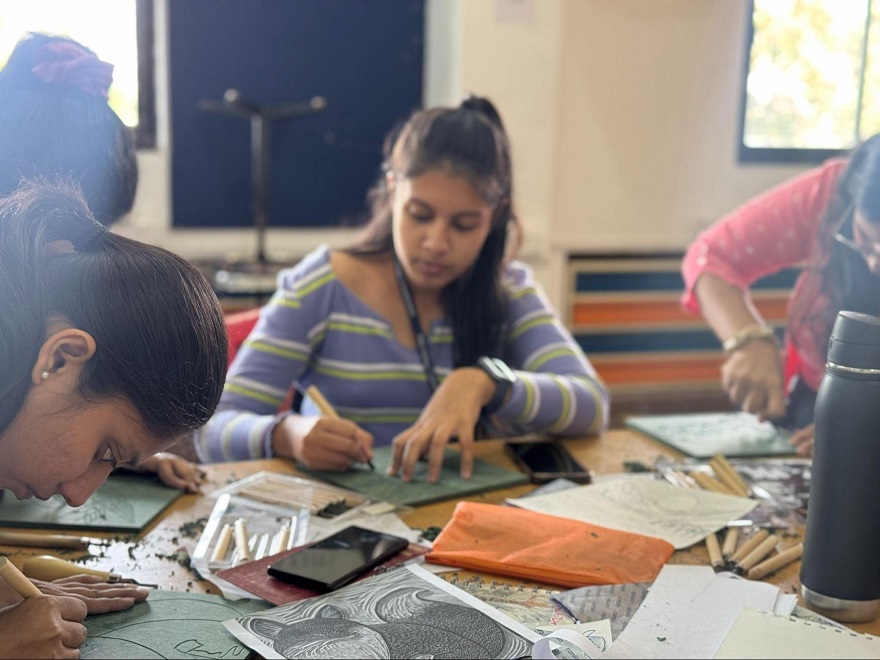
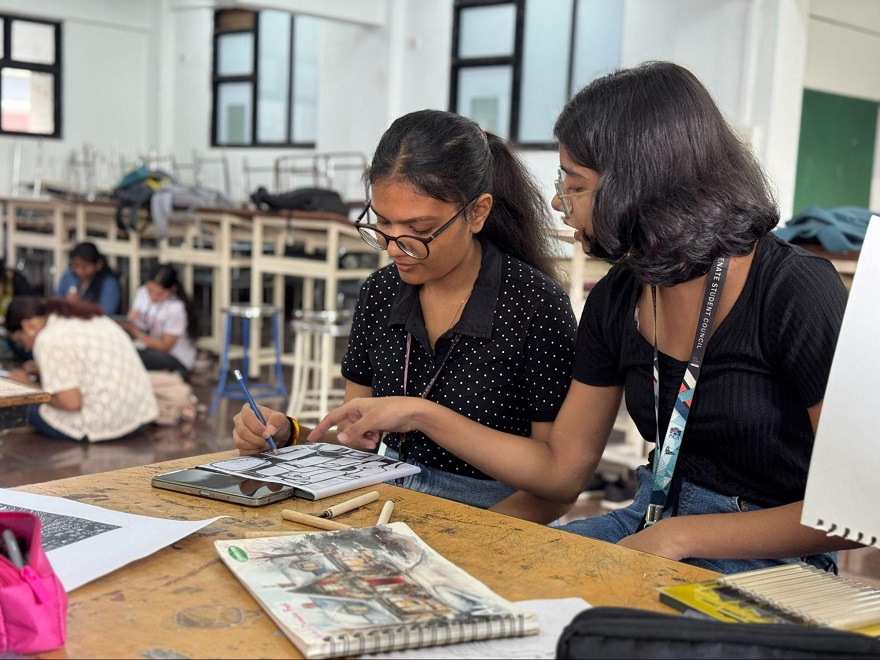
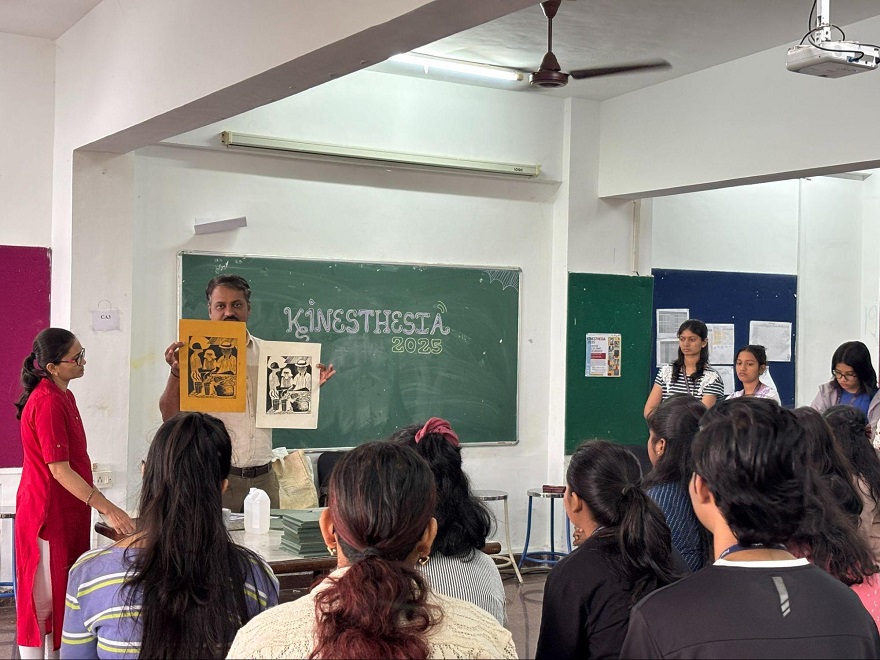
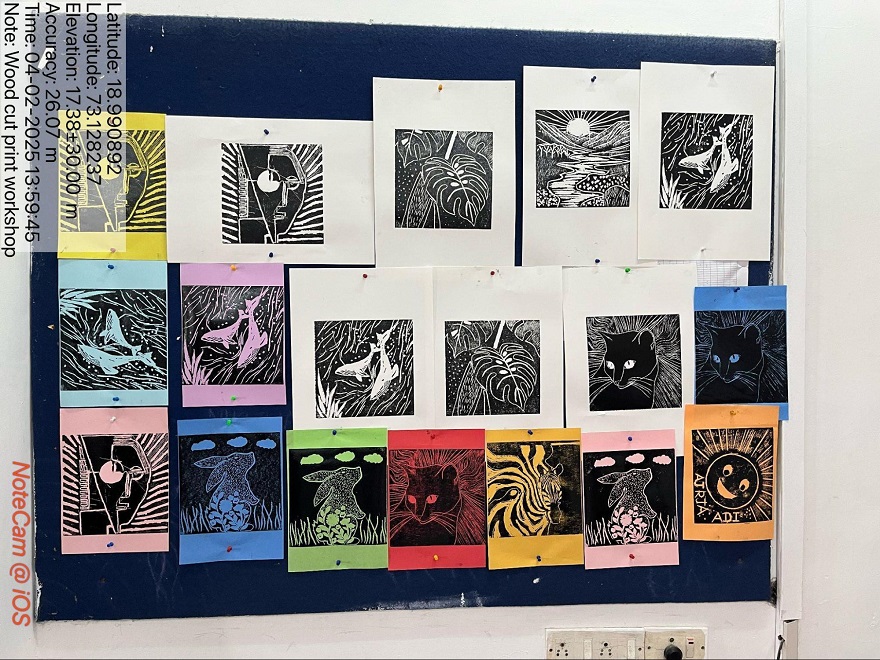
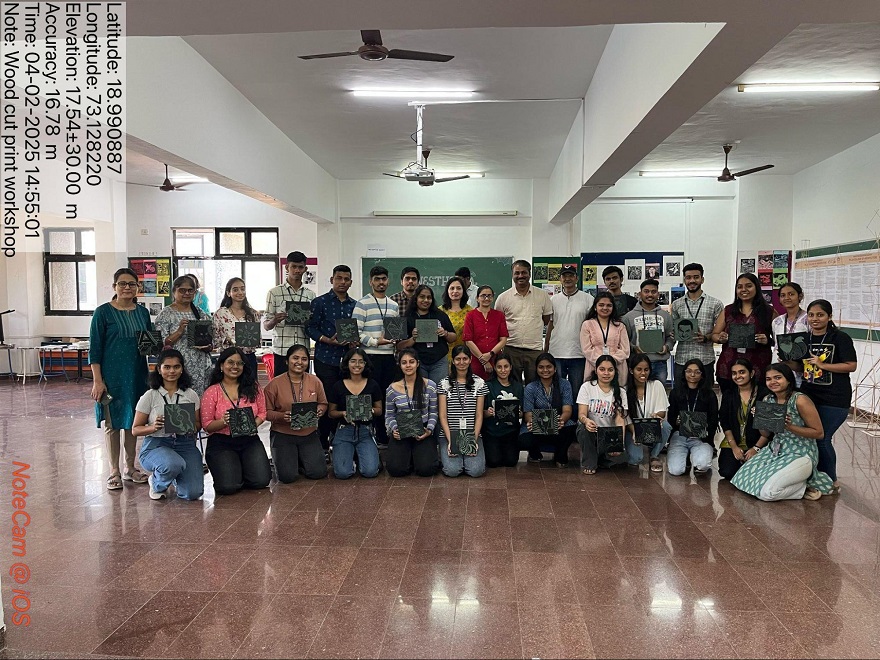
DAY 3
Day 3: Dot Mandala Workshop (Workshop 4)
Time: 8:30 a.m. to 3:30 p.m.
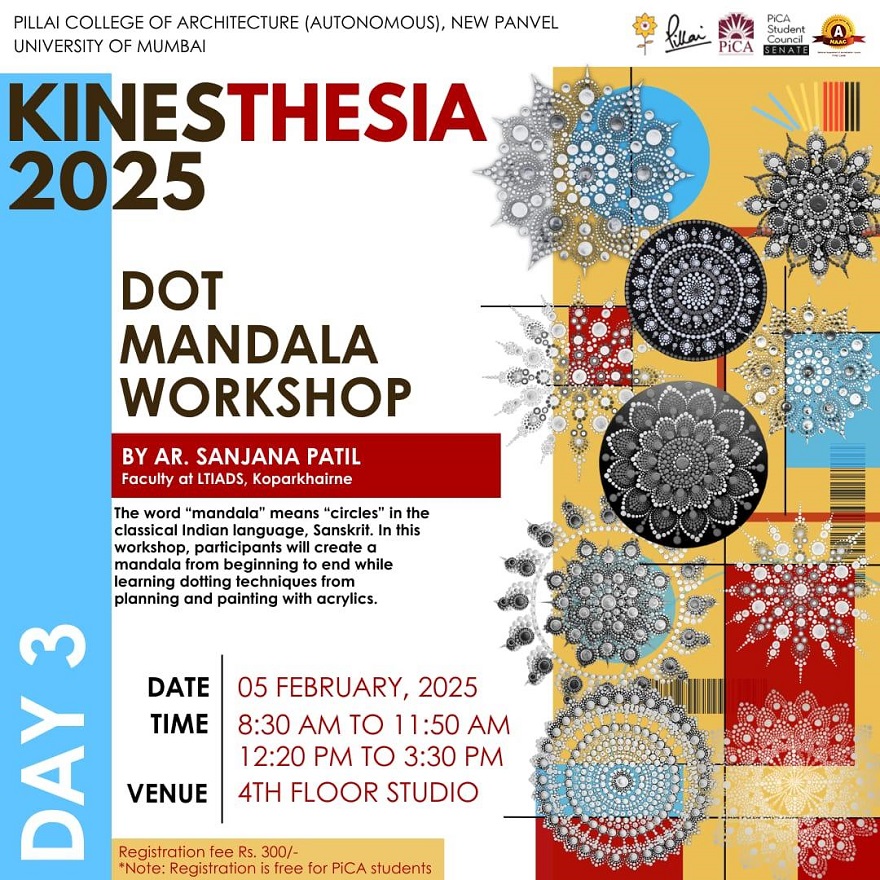
Instructor: Architect Sanjana Patil
Objective: To teach students the art of dot mandala painting, focusing on symmetry, precision, and mindfulness through creative expression.
Architect Sanjana Patil introduced students to dot mandala art, a meditative painting technique focused on geometric patterns.
The session began with a discussion on mandalas’ cultural significance and design principles. Participants practiced dot placement, brush techniques, and symmetry.
Hands-on exercises allowed students to create intricate designs using acrylic paints on canvas. Sanjana ma’am provided step-by-step demonstrations and personalized feedback.
By the end of the workshop, participants developed patience and precision in their artwork, gaining insight into the therapeutic aspects of dot mandala painting.
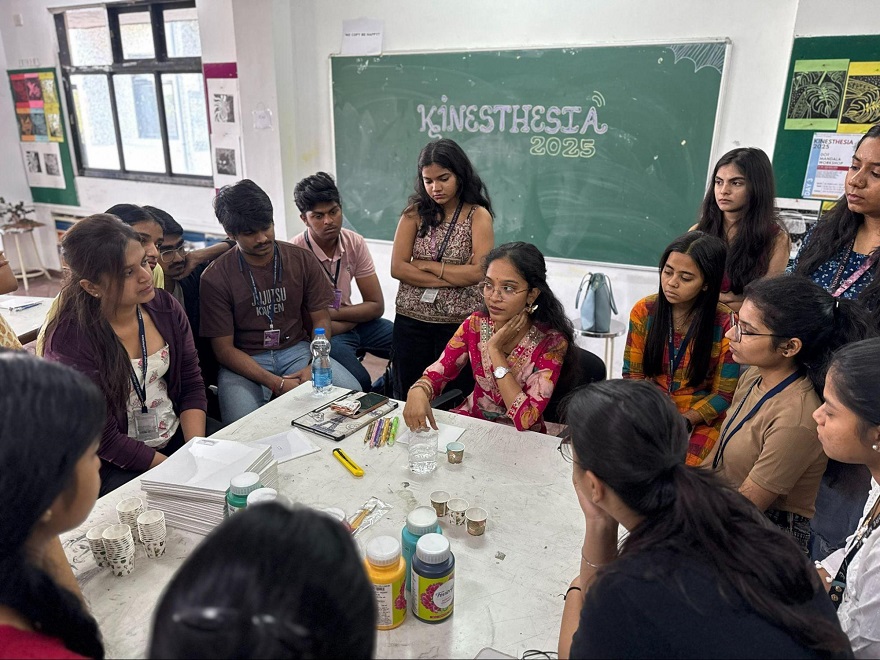
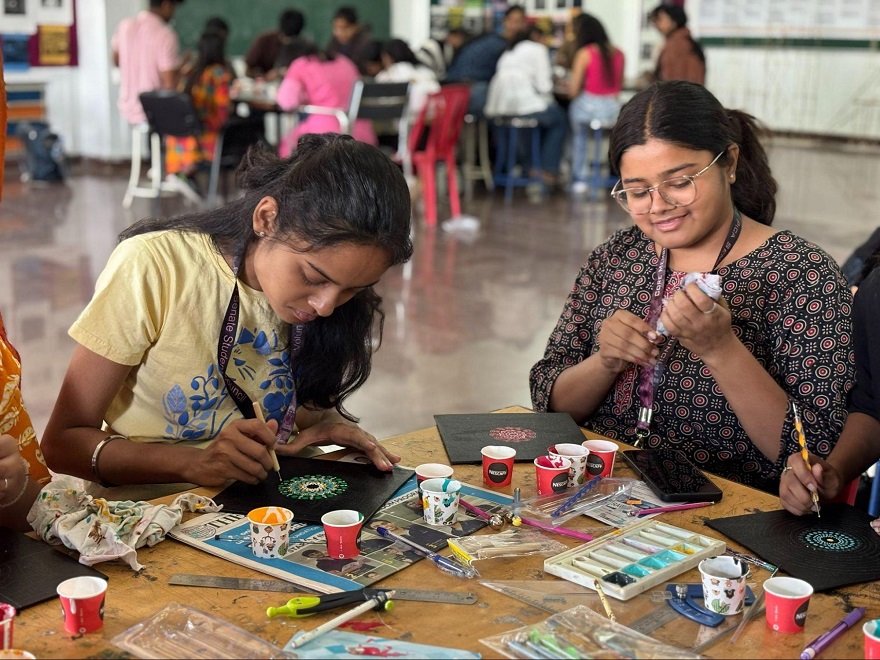
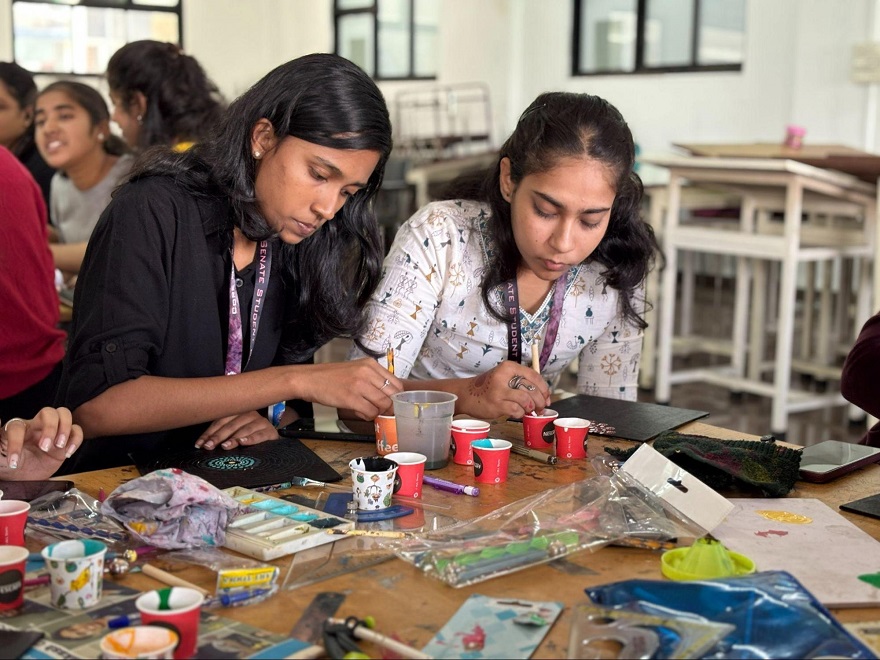
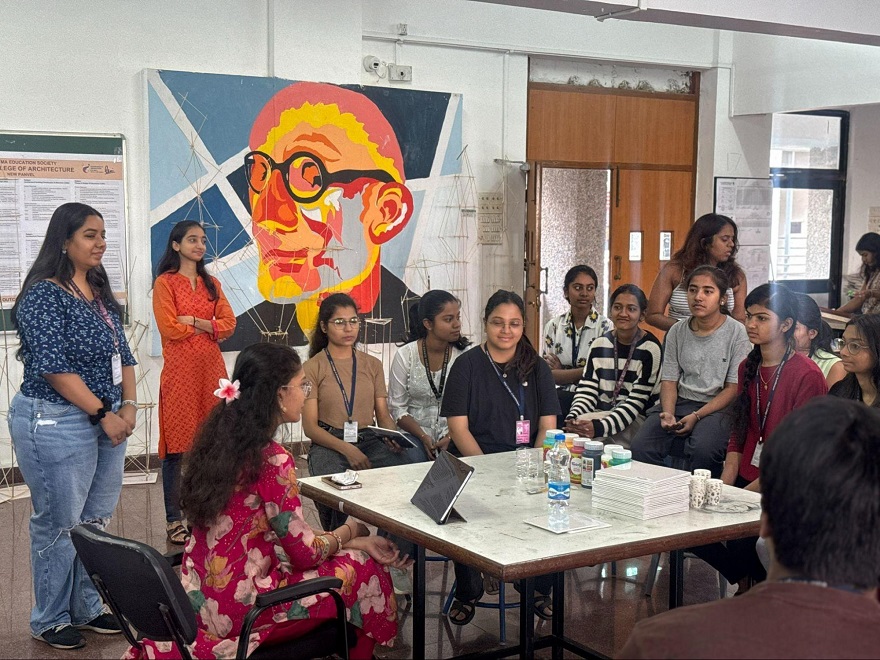

DAY 4
Day 4: Texture Mural Workshop (Workshop 5)
Time: 8:30 a.m. to 3:30 p.m.
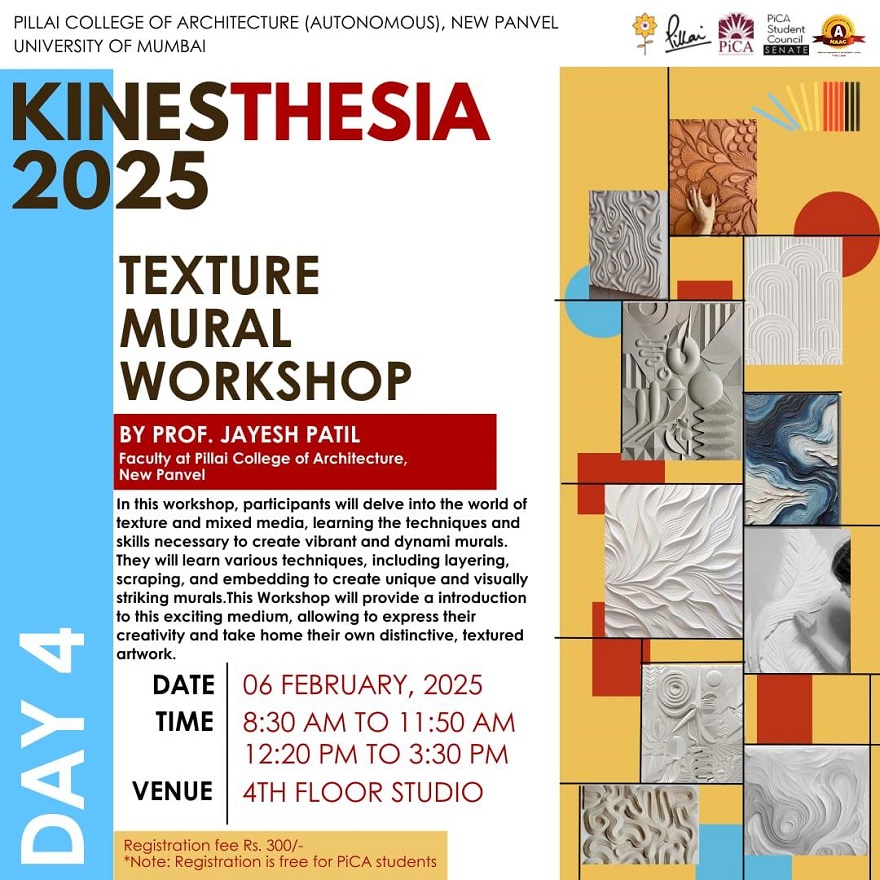
Instructor: Prof. Jayesh Patil
Objective: To familiarize students with texture mural techniques, encouraging them to experiment with mixed media and surface treatments to enhance large-scale compositions.
Professor Jayesh Patil conducted a mural workshop focused on texture creation using mixed media techniques.
The session covered material selection, layering methods, and surface treatments. Students experimented with different textures using clay, paint, and other materials.
Professor Patil guided participants in creating compositions with depth and dimension. The workshop fostered creativity and technical skill, inspiring students to explore large-scale murals in their future projects.
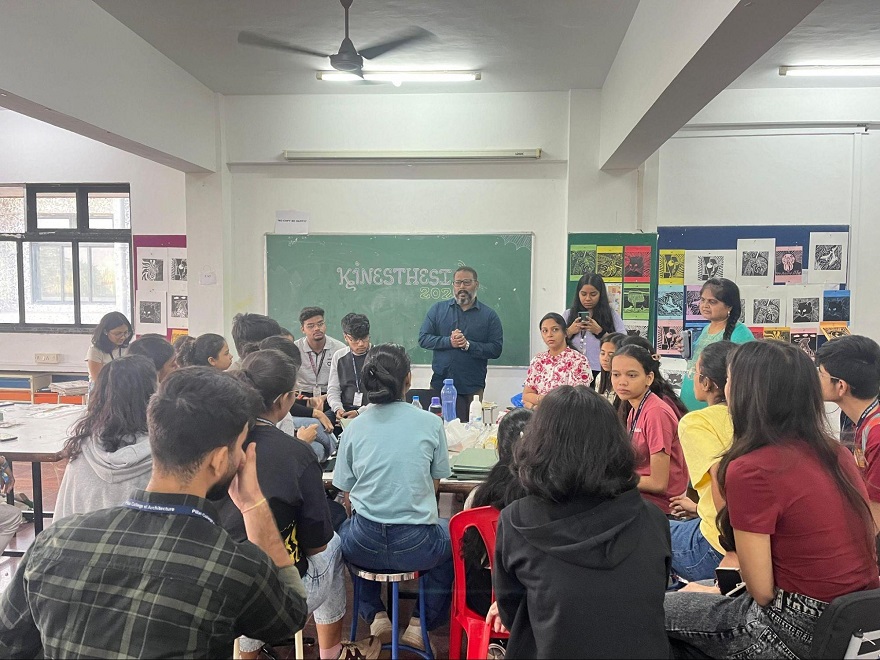
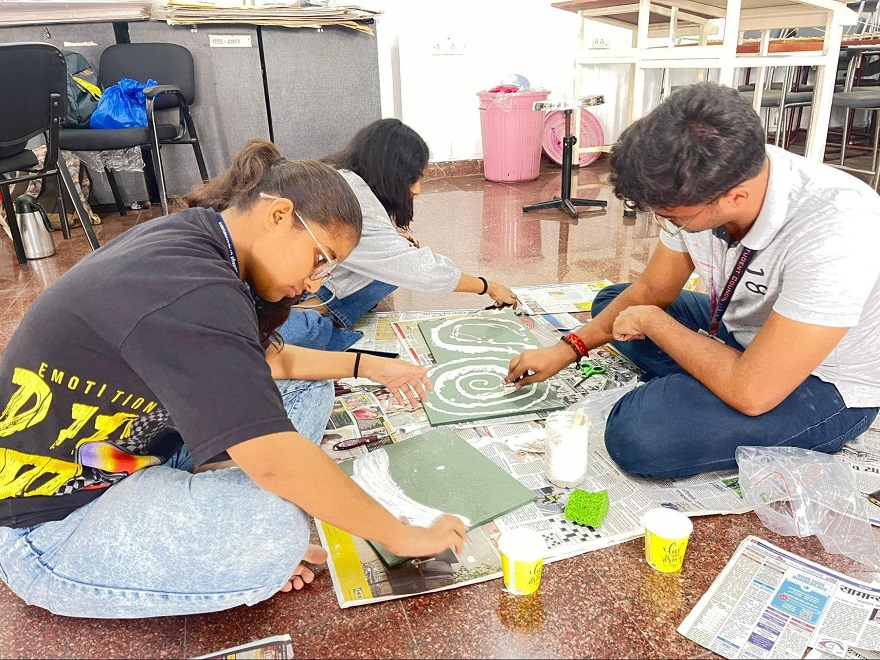
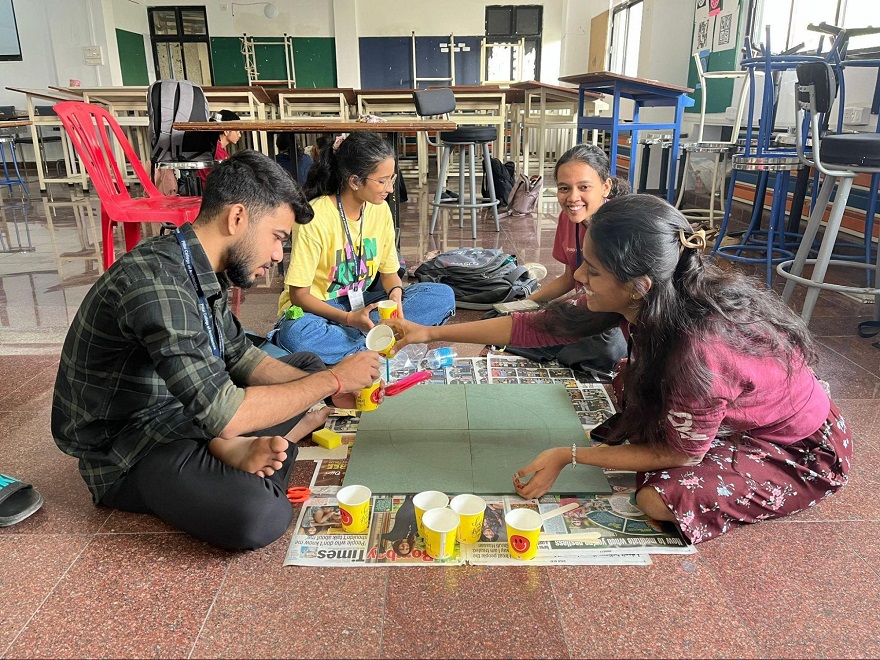
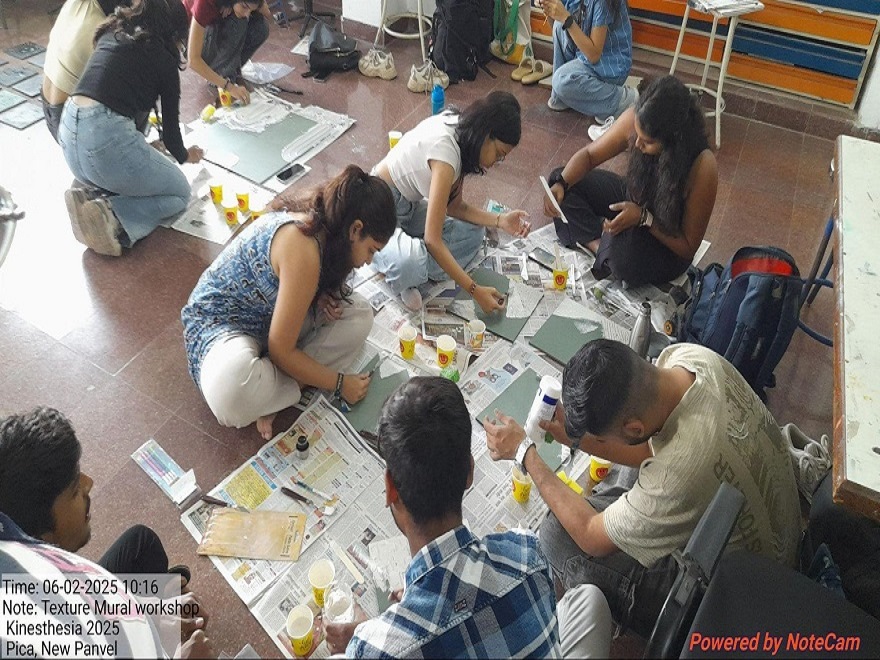
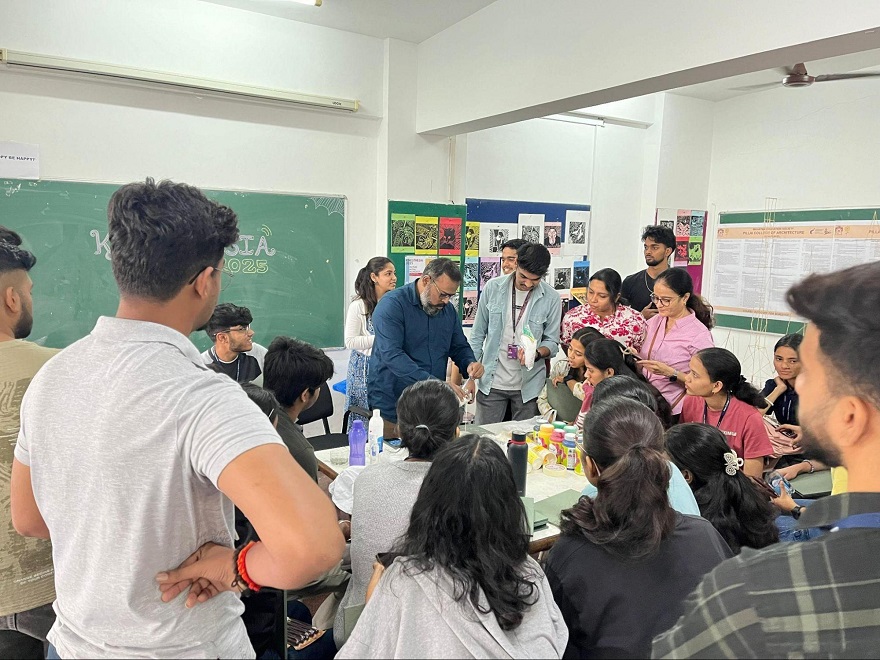
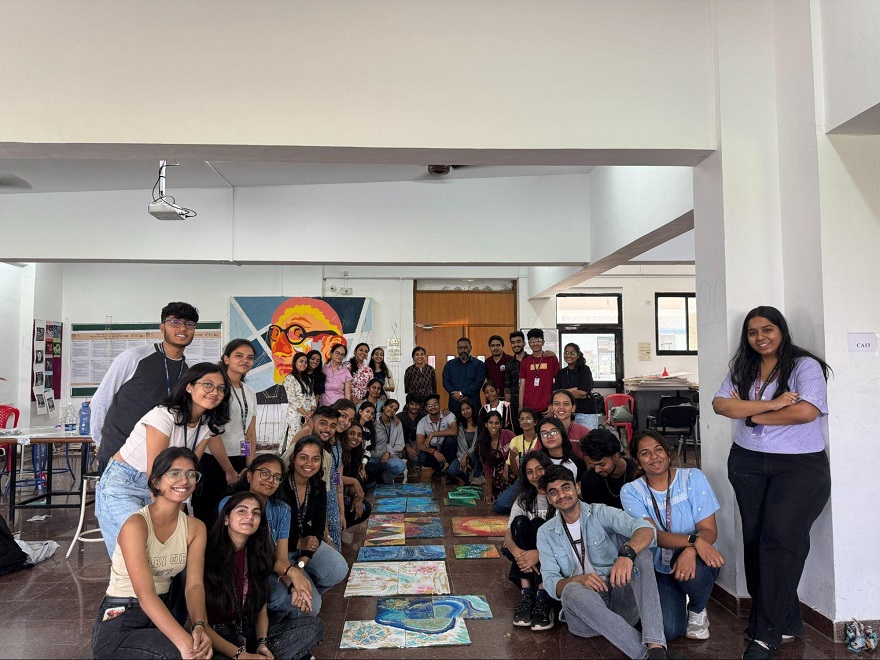
DAY 4
Day 4: 3D Printing & Laser Cutting Workshop (Workshop 6)
Time: 8:30 a.m. to 3:00 p.m.
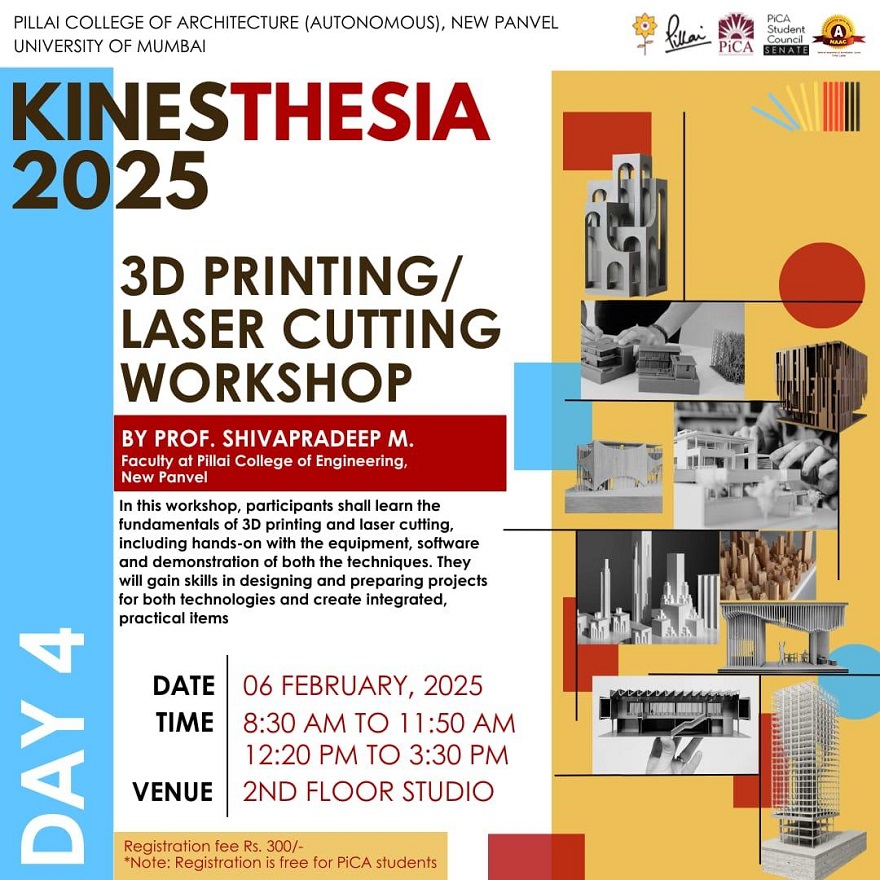
Instructor: Prof. Shivpradeep M.
Objective: To introduce students to digital fabrication techniques, helping them understand the fundamentals of 3D printing and laser cutting for design applications.
Professor Shivpradeep M. introduced students to 3D printing and laser cutting, focusing on digital fabrication techniques.
The session included an overview of 3D modeling software, printing processes, and material selection. Participants worked on design prototypes, observing the transformation from digital files to physical models.
Live demonstrations showcased the precision and versatility of modern fabrication technologies. The workshop successfully equipped students with essential skills for contemporary design applications.
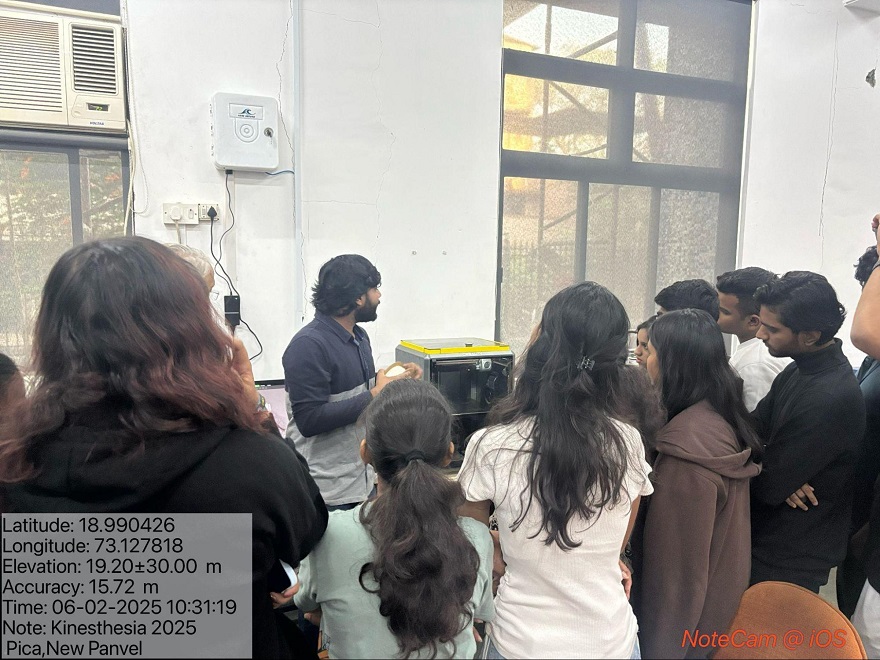
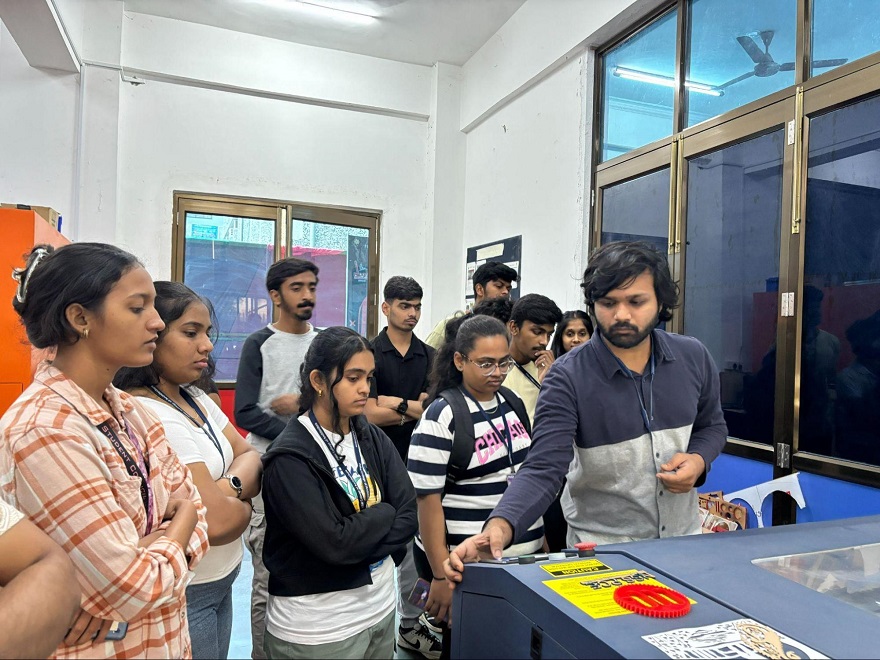
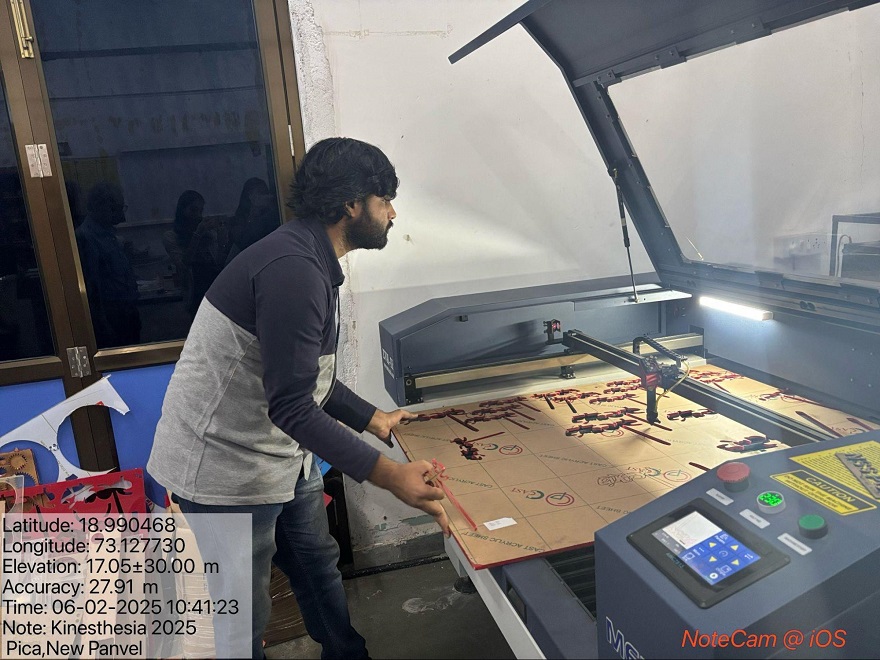
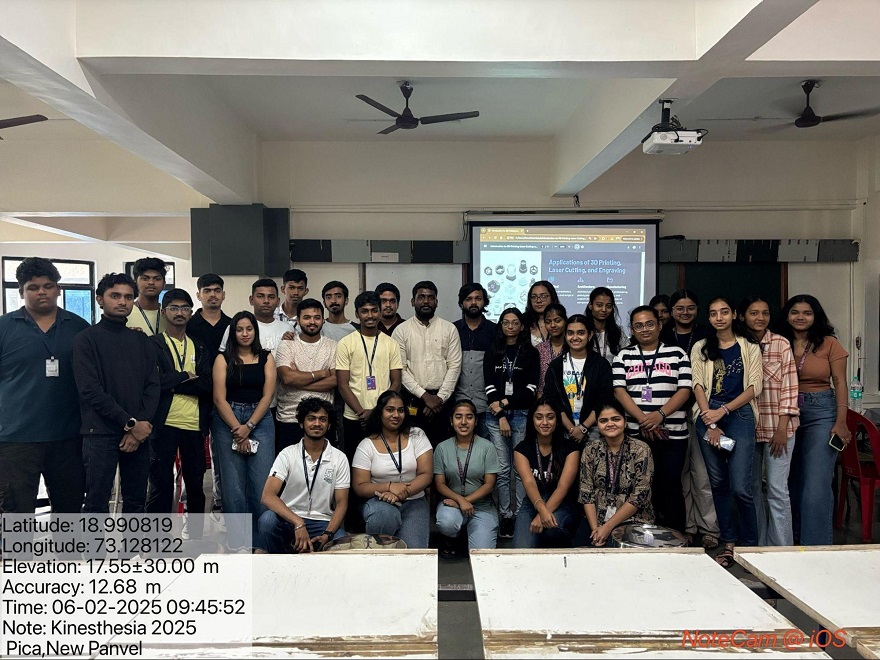
DAY 5
Day 5: Crochet Artwork Workshop (Workshop 6)
Time: 8:30 a.m. to 11:50 a.m.
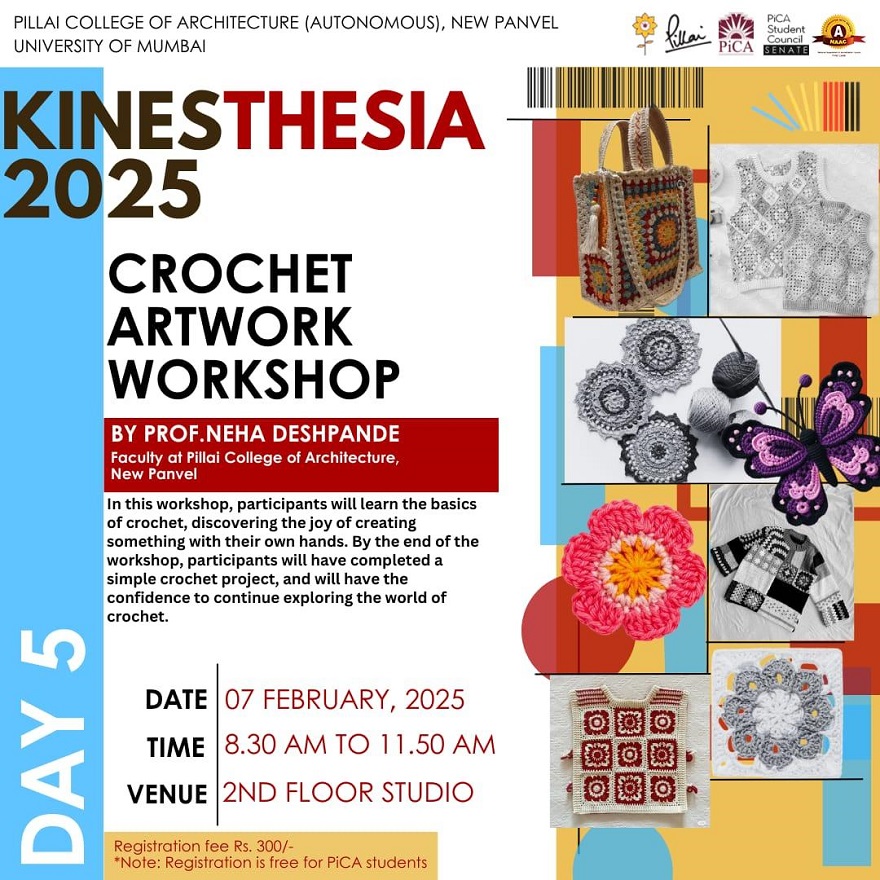
Instructor: Prof. Neha Deshpande
Objective: To teach students fundamental crochet techniques, encouraging them to explore fiber arts as a form of artistic expression and design.
Professor Neha Deshpande led a crochet workshop, introducing students to fiber art and design possibilities in crochet.
Participants learned basic crochet techniques, including foundation chain, stitching and pattern formation. Hands-on exercises allowed them to create small crochet projects.
Under her guidance students develop confidence in their craftsmanship. The workshop highlighted crochet’s versatility as both an artistic and functional craft.
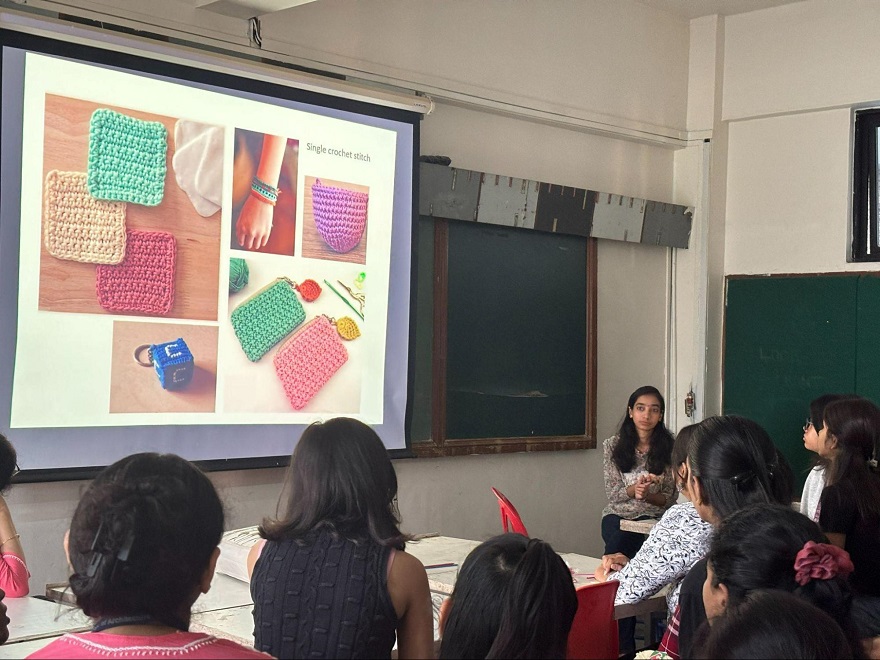
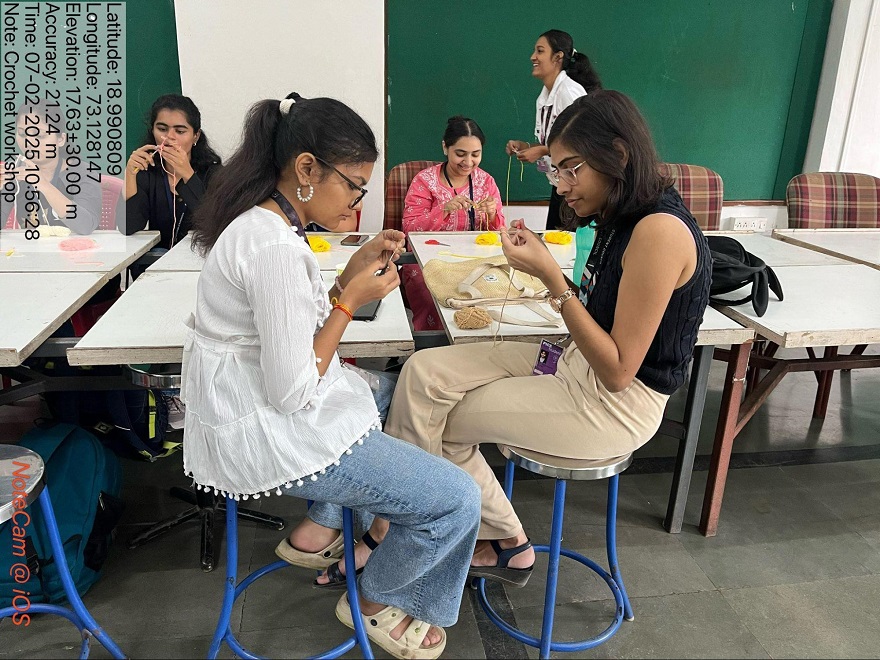
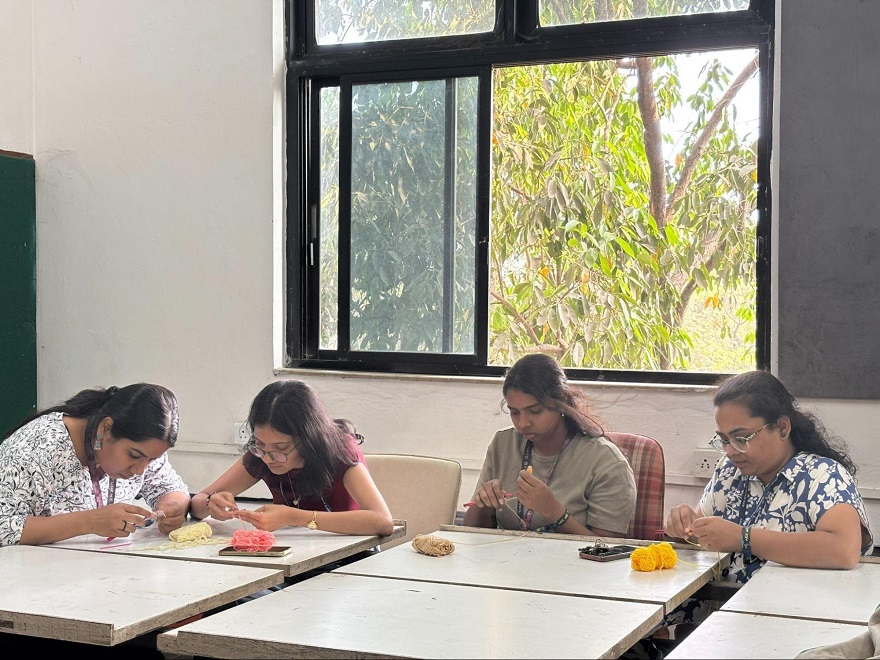
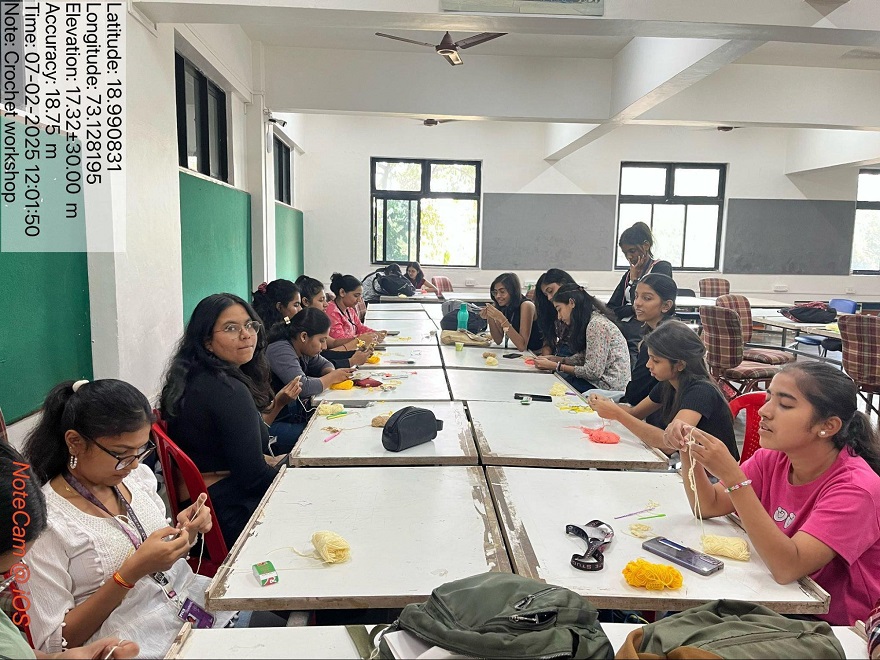
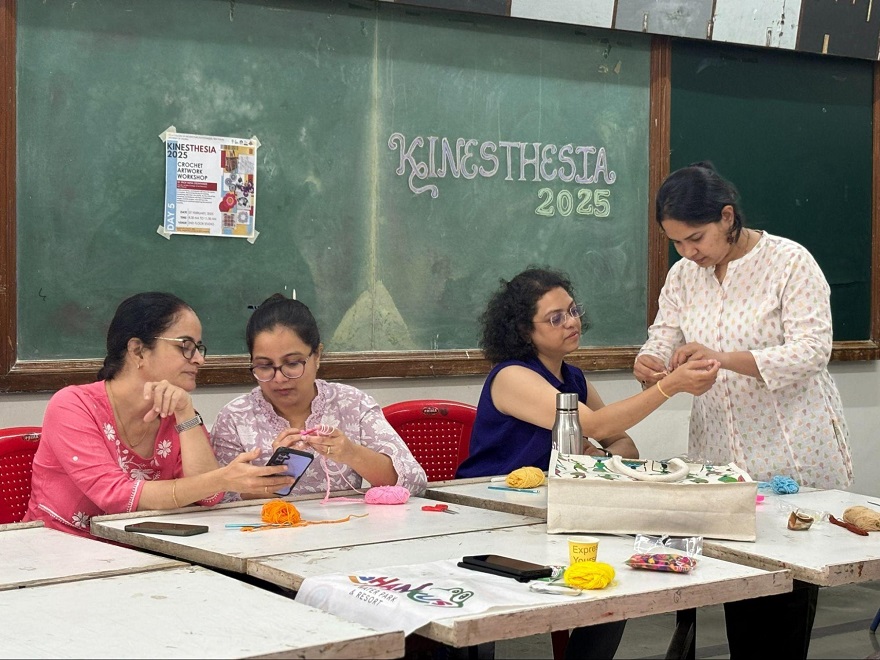
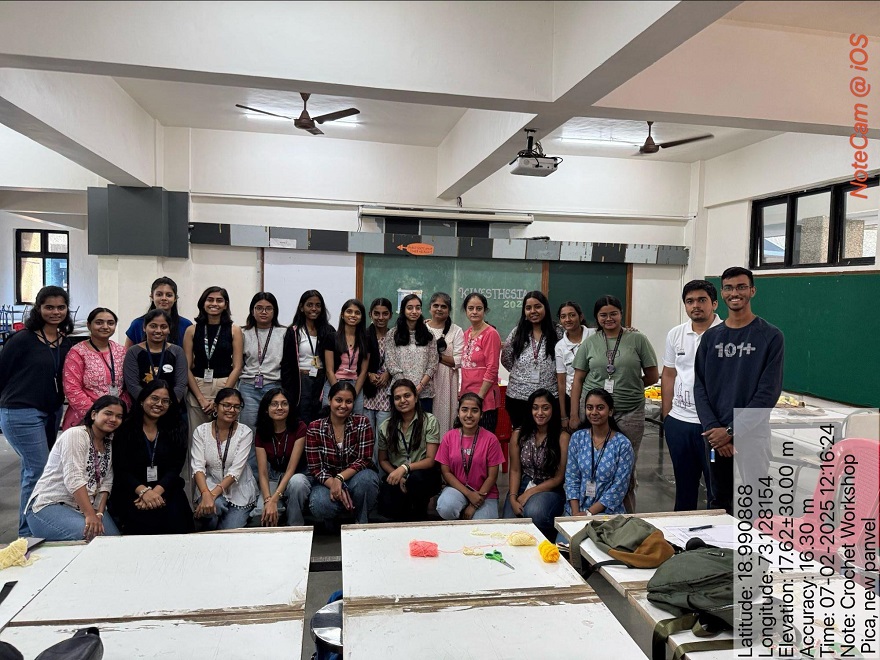
Photo & Video and Poster & Certificate Credits
Senate Social media team
Senate Graphics team

